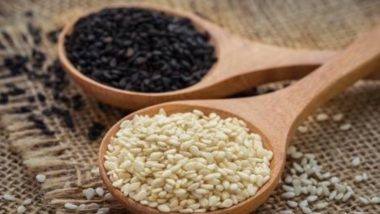Sesame seeds are a quintessential part of a Makar Sankranti spread. Be it black or white, sesame seeds are having a comeback in a major way even when it comes to daily diet. Packed with antioxidants and essential nutrients, it is easy to see why. Black or white - you might be wondering which seeds you should be eating to get more nutrition in your diet. Black sesame seeds and white sesame seeds differ more than just in colour. While both the seeds boasts its own niche, when it comes to nutrition, both black and white sesame seeds are nutritional goldmines. Here's how the seeds differ when it comes to taste, colour and nutritional value.
Colour
The most noticeable difference between white and black sesame seeds is the colour. But why the difference in colour, you ask? Black sesame seeds are not hulled while the protective casing is removed from white sesame seeds. Makar Sankranti 2020: On A Weight Loss Diet? Here’s How the Low-Calorie Tilgul Laddu Will Keep You in Shape!
Taste
Black sesame seeds have a slightly bitter taste as compared to the white sesame seeds. The white sesame seeds on the other hand, have an earthy nutty taste. Sesame Seeds For Winter: Why Til Ka Laddoo, Revadi And Other Sweet Dishes Should Be Eaten in Cold Season; (Watch Recipe Videos)
Use
Both white and black sesame seeds are used for different purposes. While the black sesame seeds produce the highest quality of oil, black sesame seeds are better suited for sweeter recipes such as cakes, cookies, laddus and bars. White sesame also finds its use in preparing tahini, a paste used in Arabic cooking. Sesame Seeds Benefits: 8 Advantages of Til for Your Hair, Skin and Overall Health
Nutritional Value and Health Benefits
All sesame seeds are loaded with antioxidants such as sesaminol, sesamolinol, and sesamolin which help fight the free radicals in your body. Plus, both the seeds have a high mineral content and are excellent sources of copper and magnesium. But turns out that the non-hulled black sesame seeds contain more calcium than the white sesame seeds. Just one tablespoon of black sesame seeds contain about 90mg of calcium. So if you are lactose intolerant, you can use black sesame seeds as an alternative source of calcium. Black sesame seeds are also rich in iron, so incorporate them in your diet if you are anaemic.
If you are not sure how to add sesame seeds to your diet, sprinkle these nutrient-rich seeds over your noodles, rice or cereals. You can also mix them with your smoothie or yoghurt to impart that nutty flavour.
(The above story first appeared on LatestLY on Jan 13, 2020 04:21 PM IST. For more news and updates on politics, world, sports, entertainment and lifestyle, log on to our website latestly.com).













 Quickly
Quickly


